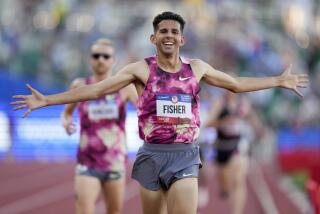Marathon man Shorter still on run
- Share via
LONDON — It has been 40 years since Frank Shorter won the Olympic marathon in Munich and 36 since he was the best marathoner again in Montreal and was deprived of another gold medal.
So it seemed fitting to check in with the patron saint of U.S distance running on the eve of London’s men’s marathon. The U.S. runners Sunday will be
Meb Keflezighi, Ryan Hall and Abdi Abdirahman. Shorter will be watching, rooting.
He will also be running himself. He has never stopped. He will turn 65 in October and weighs about 136-138, same as at the pinnacle of his career, when fellow runner Marty Liquori called him “a vertical hyphen.”
“I still go six days a week,” Shorter said.
He is in Falmouth, Mass., this weekend to run a road race he won several times, and this time, to mostly be there with fellow marathon legends such as Joan Benoit and Bill Rodgers. Shorter is a lawyer, public speaker, TV commentator and, to this day, the symbol of a ‘70s and ‘80s running boom.
His story is a lengthy book. The Reader’s Digest version must suffice here.
Were the playing field level, Shorter would be listed as one of only two people to win two Olympic marathons. Abebe Bikila of Ethiopia did it in 1960 and ’64.
The Munich marathon was scheduled for Sept. 9, 1972. Four days before, Palestinian terrorists infiltrated Israeli housing in the Olympic village and eventually killed 11 Israeli athletes and coaches. Shorter and his running roommates watched from the balcony of their village apartment, perhaps 150 yards away, as negotiations took place. After the murders, Shorter listened as a leading marathon contender complained that the terrorism had caused a one-day delay in their race and disrupted his preparations.
“I knew he wouldn’t be a factor,” Shorter said. “He was focused on the wrong thing.”
About halfway through the race, Shorter pulled away and soon entered the stadium for a last triumphant lap. He heard booing and hissing.
“I thought, jeez, I’m an American,” Shorter said. “Give me a break.”
A 17-year-old impostor had jumped onto the track and run before Shorter’s entry. Soon, officials realized what was happening and removed him. About that time, Shorter entered.
“I never saw him,” Shorter said.
But he came close three weeks ago, when a German television network brought him back. He had returned to Munich, where he was born, 15 years after his race. Then, not again until three weeks ago.
“I toured some of the spots, and the stadium, while they filmed,” Shorter said. “I think it was set up for a TV meeting of me and the impostor. Turned out, he didn’t want to do it, although I did talk to him on the phone.”
They still haven’t met, and the impostor’s name never got big play, mostly because reporters in Munich made a pact not to let him get fame from this.
“Imagine that happening today,” Shorter said.
Shorter had a Yale law degree and had passed the bar, but he kept training and was the man to beat in Montreal.
In the race, an unheralded East German, Waldemar Cierpinski, ran with him, then broke away in the hills. Each time Shorter took a run at Cierpinski, the East German sprinted away.
“At 23 miles, I got within 50 meters of him,” Shorter said. “He turned, saw me and sprinted away. It was not how you see people run the last three miles of a marathon.”
Shorter finished second, congratulated Cierpinski and wondered for years. Then, in the late 1990s, after East Germany’s state-run doping was revealed and 105 East German athletes sued the drug company that supplied steroids that had caused later-in-life illnesses, Shorter was given official documents that included Cierpinski in the experimental group.
“His East German testing identification was Code No. 62,” Shorter said. “He won’t talk about it now.”
Shorter, along with others apparently shortchanged in those Olympic years, sought to have results reversed. The International Olympic Committee, then made up mostly of recalcitrant relics, refused.
As past chairman of the World Anti-Doping Agency, Shorter still follows that world closely and sees great progress.
“There has been a psychological change,” he said. “Our athletes now know they have a chance.”
He brought his Montreal experience into a London time frame by calling it a moment “like a Chinese swimmer.” He said the current IOC practice of keeping samples around for eight years and retesting them is crucial.
--
“Stay tuned,” he said.
More to Read
Go beyond the scoreboard
Get the latest on L.A.'s teams in the daily Sports Report newsletter.
You may occasionally receive promotional content from the Los Angeles Times.







